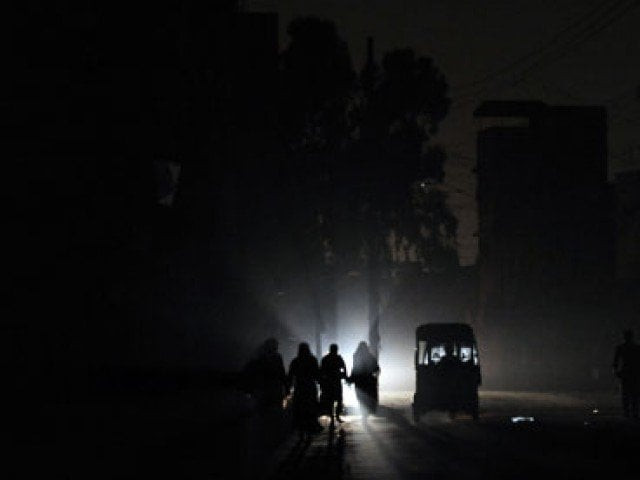Tug-of-war: PNSC-PSO spat may cause nationwide blackouts
For the record, it is crystal clear that PNSC is trying to blackmail PSO to get unjustified freight rate increase

File photo of a blackout. PHOTO: AFP
The government-mandated, state-owned monopoly on the fuel supply chain of the country appears to be breaking down just as the country is going through a heat wave and the national grid is unable to bear the load of increased demand.
Power outages, which are already lasting longer than the government had hoped, may begin to get even longer.
The Pakistan National Shipping Corporation (PNSC) refuses to provide vessels for fuel transportation to the Pakistan State Oil after the government barred PNSC from its more lucrative contracts for transporting petrol and diesel. The government had placed that ban earlier this year in a bid to ensure sufficient capacity on PNSC’s ships for furnace oil cargoes.
Read: Jilted titans: The short-lived affair between PSO and PNSC
In a letter sent by PSO management to the petroleum ministry, a copy of which was made available to The Express Tribune, the country’s largest oil company warned of the risk of furnace oil stocks across the country drying up due to PNSC’s refusal to nominate vessels for furnace oil cargoes.
Sources in the petroleum ministry said that PNSC had initially delayed providing three vessels for furnace oil imports in early June, which led to power outages. Now they report that PNSC has refused to supply vessels in the future as well, with potentially devastating circumstances for the general public.
The PSO management says that, despite repeated reminders, the oil company had not yet received a schedule of vessels nominated for furnace oil cargoes, which is exposing the national energy supply chain to the risk of dried out fuel supplies in the middle of the summer peak, which this year coincides with the Ramazan spike in energy consumption. For this situation, PSO management places the blame squarely on the PNSC.
Read: Oil supply: Government wants to keep PSO-PNSC contract intact
“It clearly shows the mismanagement and poor planning of PNSC for provision of vessels in time despite earlier information from PSO since May 8 onwards. Now due to the last hour need for the chartering of vessels, PNSC is saying that it is facing issues in the provision of vessels and showing their inability to provide the same,” states the PSO letter to the petroleum ministry.
Ultimately, it seems that neither side is happy with the government-mandated rule that says that PSO must rely on PNSC and vice versa. The PSO management tried to convince the petroleum ministry that PNSC simply does not have the capacity to handle its cargo needs. “The inability also signifies that PNSC is once again chartering vessels from the international market and does not have the capacity to cater to the HSFO [high-sulphur furnace oil] and crude oil demand of Pakistan’s industry,” the letter said.
The heart of the problem appears to be the difficult economics of having a government rule force PNSC into committing its vessels to a low-margin business. To compensate, PNSC has tried to increase its margins, which PSO has resisted. “For charging actual cost plus 10% for PNSC’s own vessels on account of service charges, why must PSO give an undertaking for such exorbitant increases in freight rates and then at same time undertake the risk of quality issues at discharge at the port. It makes no economic sense,” said the letter.
PSO management believes that the PNSC claim that they have capacity constraints is a ruse to get PSO to pay more for freight on what would otherwise be a cheaper cargo.
“For the record, it is crystal clear that PNSC is trying to blackmail PSO to get unjustified freight rate increase,” the letter adds.
Read: Oil transportation: PNSC fears losing business to PSO
Meanwhile, protests erupted across the country as the heat wave caused a sharp increase in peak power demand, which coincided with the Ramazan demand surge. In Sindh, demonstrations took place in Karachi, Hyderabad, Tando Allayar, Tharparkar, Nawabshah, and Nawabshah. In Karachi, protesters fired gunshots into the air in anger, damaging a transformer that only worsened the power crisis in the country’s financial capital. In other parts of Sindh, at least six heatstroke deaths were reported. In Nawabshah, residents surrounded the office of the Hyderabad Electric Supply Company and burnt tyres.
In Khyber-Pakhtunkhwa, the demonstrations were led by members of the provincial assembly from the ruling Pakistan Tehreek-e-Insaf. PTI MPA Mohammad Arif, along with party office-bearers and supporters marched to the Peshawar Electric Supply Company (Pesco) office in Peshawar. There were also protests in Chitral, Lower Dir, and Shangla.
Published in The Express Tribune, June 23rd, 2015.


















COMMENTS
Comments are moderated and generally will be posted if they are on-topic and not abusive.
For more information, please see our Comments FAQ